Veteran’s Testimony – Theodore Ross Willits Hospital Train No. 23

Studio photograph of T/5 Theodore Ross Willits (ASN: 15107889)
Induction & Training:
Theodore Ross Willits was born on 12 December 1921 to Donald Pray Willits and Hilda Ballard Ross in Hancock County, Indiana in the home of his grandfather, Walter E. Ross. Ted spent his early years at the farm until his father’s work moved them to the east side of Indianapolis. He tells stories of his elementary school years there: summers roaming the neighborhood with his older brother Burt, eating mulberries from trees in Ellenburger Park for lunch and being called to come home at dark. One summer Ted, Burt and their younger siblings Betty and Bill each had the measles, one following the other. The four children were under quarantine all summer except for two weeks, the week after school let out for vacation and the week before the new school year started in the fall.
In the fall of 1935 Ted moved back to Hancock County to live and work with Paul and Julia Oldham on their farm adjacent to the Ross home. He attended Charlottesville High School and graduated in the spring of 1939. Ted continued to work for the Oldhams until his enlistment in the Army in August 1942.
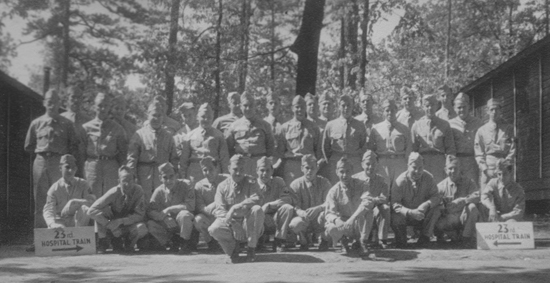
Photograph showing members of Hospital Train No. 23 at the time of the unit’s activation.
Ted, an experienced and talented mechanic, had a commitment to enlist as an Air Corps mechanic; the Induction Center assigned him to the Medical Department. He was sent to Camp Pickett, Blackstone, Virginia (Division Camp -ed), for one month of training then to school at Lawson General Hospital in Atlanta, Georgia. The course was six weeks of “med tech” school, one week of field training and one week of hospital observation. The soldiers were told it was the same information taught in a three-year nursing school program. After graduation he was assigned as a Medical Technician to Hospital Train No. 23 that was activated at Fort Benning, Columbus, Georgia (Army Ground Forces Training Center & Infantry School -ed) on 12 November 1942. There, Ted served as company clerk for a short period of time when it was discovered the soldier assigned to the task didn’t know how to type, or even how to get paper rolled into the typewriter. Ted didn’t care for the job and asked to be reassigned to his former duties. The unit was transferred to Fort McPherson, Atlanta, Georgia (Reception & Reclassification Center -ed); then Camp Forrest, Tullahoma, Tennessee (Infantry Division Camp -ed) and finally to Fort Dix, Wrightstown, New Jersey (Training & Pre-Staging Center -ed) to wait for deployment to Europe.
United Kingdom:
At 0930 on 12 September 1943 the British flagged ship RMS “Mauretania” (British ocean cruiser, commissioned 1938 –ed) with the Hospital Train No. 23 crew aboard cast off, sailed passed the Statue of Liberty and out of the New York harbor. During their seven-day crossing they had air escort only for most but not all of the way. They arrived at the port of Liverpool, England, on 19 September and immediately boarded a train traveling through the night to Swindon and then by truck to a new hospital about four miles out of town. The unit stayed there until 1 October when they were moved to another new hospital, Ullenwood Army Hospital, up a hill from the center of Cheltenham Spa. Ted and his unit were assigned to clean the facility and grounds and make it ready for an outfit coming from the US. On 7 October 1943 Ted and six other members of the unit were awarded the Good Conduct Ribbon in a ceremony.

Letter from the Commanding Officer Major Edward B. Shires announcing the award of the Good Conduct Medal to members of Hospital Train No. 23.
The first patients arrived at Ullenwood on 16 October. The Medical Technicians worked twelve-hour shifts, with Ted being assigned night duty on the neurotic patient ward on 17 October. The ETO Medical Department Headquarters was about 50-60 miles away under the command of General Lewis B. Hershey. The proximity of Ullenwood made it a convenient place to bring visiting dignitaries for inspection tours. When that happened all off-duty staff had to leave and were given passes to town. Since Ted was working the night shift that meant he had to leave when he should have been sleeping. He remembers going to town and spending the day walking around then going back for his next shift. As a consequence he went 36 hours with no sleep. During another daytime inspection he was so tired he remembers trying to sleep under a tree.
Early in November 1943 the train was completed in Glasgow. On 26 November Ted was hospitalized for two weeks with nasopharyngitis. There was a large outbreak and the hospital was admitting thirty (30) patients a day, enough to fill a ward. Because of his hospitalization, Ted missed a DS assignment which included traveling to Scotland, clean the new train, prepare it and bring it to the unit.
This is Ted’s diary entry from 12 December 1943, “My first birthday overseas. Have the day off.” He was 22 years old. In the days before D-Day Hospital Train No. 23 moved soldiers between hospitals and ships taking them back to the US. Most of these patients were soldiers who were found unfit for service.

Photograph showing crew of Hospital Train No. 23. Standing, left to right:
Martin Lepavski, Ted Willits, William Jones. Squatting: Abraham Fishman.
On 11 January 1944, Hospital Train No. 23 displayed a single car, a converted dining car, to dignitaries at an exhibition outside of London. Ted’s diary entries indicate that Colonel John A. Rogers, First United States Army Surgeon, and other high-ranking American and British Officers toured the train along with Members of Parliament, and officials of the British Government
Ted remembers on the night of 5 June, around 2130 as the light was fading, seeing the waves of planes he knew held paratroopers heading for the continent. They knew it was the start of the invasion. On 10 June 1944 Hospital Train No. 23 made its first trip to pick up patients in Southampton. They made 6 trips in June, 11 in July and 12 in August.
France and Belgium:
On the night of 23 September 1944 the unit left England and ferried to Cherbourg, France, the port that they would bring patients to for transfer to Hospital Ships. Over the next few months, Ted’s diary is a series of notations of towns where Hospital Train No. 23 picked up patients from the Field Hospitals, and dates they unloaded them to Hospital Ships in Cherbourg. On 27 September he notes they transported a load of Free French fighters. Ted remembers an eight (8) week period when they stopped only to take on supplies and to load or unload patients. The length of the trip from a Field Hospital to Cherbourg varied from a few hours if the patients were being transported from Paris to a day or more from more remote hospitals. In one diary entry he recorded traveling 59 hours from Liège, Belgium to Cherbourg, France. Fully loaded the train carried around 325 wounded soldiers. The most severely injured patients were placed on the bottom of three (3) tiers of beds, and the least severely injured on the top. The Medical Technicians’ job during the transport was to “continue the treatment” that the hospital had prescribed and to give any other care the patients required. Penicillin was administered every 3-4 hours along with other medications. Ted remembers some patients looked like “pin cushions” because they were given so many injections. Because of the possibility of addiction, when patients asked for sleeping pills, they were first given “sugar pills.” If they didn’t fall asleep, then they were given sodium amytal which was known as “Blue 88”. Ted says, “You can name almost any injury and we saw it.” The most incapacitated patient he cared for had all four limbs in casts, yet was cheerful and appreciative of the staff’s care. No soldiers succumbed to their injuries while being transported by Hospital Train No. 23.
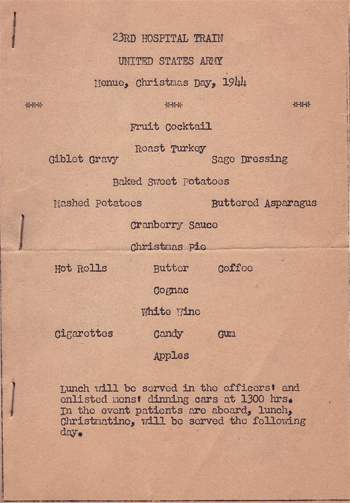
Christmas Day, 1944 menu as issued to all crew of Hospital Train No. 23.
According to a booklet announcing their “Menu, Christmas Day, 1944” the personnel aboard at that time were Officers who were Doctors or Surgeons, 7 Officers of the Army Nurse Corps, 1 Pharmacist, and 26 Medical and Surgical Technicians. The staff further included Army Sergeants, and a support group of personnel, such as 8 cooks and some members of the Transportation Corps. The locomotive was operated by French engineers.
On 9 January 1945 our Hospital Train had picked up a full load of patients in Bar-Le-Duc. The following day in the railway yard at Lison, France, they were waiting to be switched to a main line to Cherbourg. As a train on another line was being moved it derailed, igniting a gasoline pipe. The fire spread to a munitions train about 250 yards from Hospital Train No. 23. Ted remembers it was just before dark; they had finished feeding the patients. He carried trays to the kitchen area, sat them down in the sink. Ted closed the blackout curtain on the window opposite the sink and as he walked away, the first blast blew the windows out of the train and the curtain blew inwards “following” him across the room. Ted remembers another T/4, William Jones, who suffered facial lacerations from flying glass and was sent by one of the Nurses to lie in a bunk until she could tend to him. The next explosion threw him from the bunk onto the floor cracking a rib. This is the only injury suffered by either patients or crew.
There were a total of five explosions. After the last one the commanding officer, Major Edward B. Shires (CO > Hospital Train No. 23), said any ambulatory patients could leave the train and take shelter in the hedgerows. About half of the patients did so, many of them suffering from frostbite, some helping more severely injured patients even when they shouldn’t have been walking themselves. The crew followed with their medical kits and pockets filled with bandages.
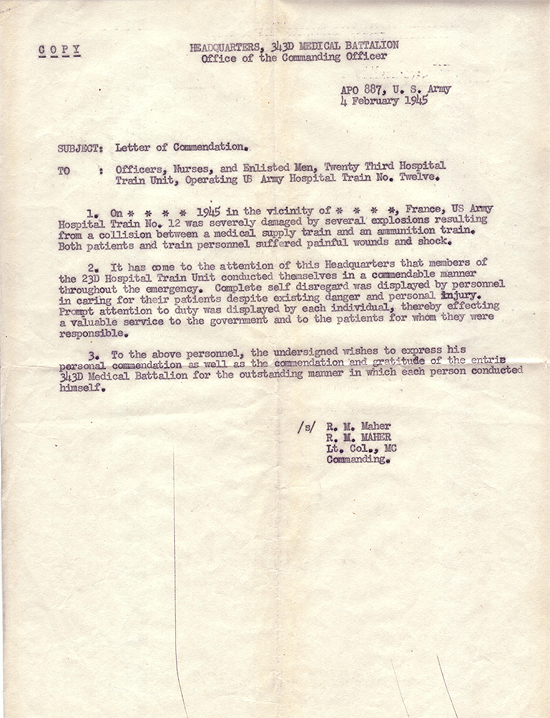
Letter of commendation received from the 343d Medical Battalion commending the personnel for their actions during the accident.
By midnight, about 5 or 6 hours after the explosions, they got most of the patients back on board. In the morning they went out and found the remainder of them. A three-foot section of rail had been damaged behind the train. After it was repaired, they backed off and continued to Cherbourg where they unloaded 11 January, returning to Paris on 12 January for repairs
The unit received a Letter of Commendation for their actions in the emergency which incorrectly stated the accident was a collision of two trains.
The train was back in service on 21 January picking up loads of patients in Nancy, Bar-le-Duc, Commercy and Verdun through the month of February 1945. By March Hospital Train No. 23 was being sent into Belgium to Liège and Namur evacuating patients from the Battle of the Bulge.
Decommission and Transfer:
On 27 March 1945, the train was back to the shop in Paris (Gare St.-Lazare) for a paint job and repairs. Around the end of March or the beginning of April, Hospital Train No. 23 was decommissioned, and the remaining staff was sent to the 45th Field Hospital in Cheltenham, England.
Shortly before that time Ted was reassigned to an Infantry unit. As a T/4, he would keep his Sergeant rank and become a Squad Leader. He was sent to a camp in eastern France as an Infantryman, given a rifle, instructed to memorize its number, remove the cosmoline and clean the weapon thoroughly. A vat of hot water was set out for the soldiers to dip the rifles in to melt the grease. Ted said if you were one of the first to use the water, cleaning the gun was a quick, easy process. If the water had cooled and become greasy from the other rifles, it took a lot of work. Ted spent three days cleaning his rifle. When he presented himself at his new assignment, he was asked what he was doing there, because he was one of the “urgently required Technicians”. So, he was transferred to another Replacement Depot to be assigned to a medical unit! He spent the next four months moving from camp to camp, through Belgium, Luxembourg, Germany and finally being assigned to a hospital unit in Czechoslovakia.
Return to the ZI and Discharge:
In October 1945, while Ted was on furlough in Switzerland, the hospital unit was shipped out, and he was re-assigned to an Ordnance unit. The Army planned for the unit to drive trucks and equipment to the coast for transport back to the US. After a while that plan was dropped and the personnel were loaded on trucks and driven to Antwerp, Belgium. On 12 December 1945, his 24th birthday, he boarded a ship for home. They encountered a storm in the Atlantic that the captain tried to sail around; after a few days he had to sail through it. The seas were so high that the bow of the ship would rise out of the water as she crested a wave, then the vessel would slam down as she topped it, lifting its stern and exposing its propellors. They fortunately reached New York Port of Embarkation safely on New Year’s Eve. Ted was honorably discharged at Camp Atterbury, Columbus, Indiana (Division Training Camp -ed) on 6 January 1946
Ted returned to the Oldham and Ross farms. He met his wife, Mary Elizabeth Kidwell, within a year of his return, and they lived on the Ross family farm raising their three daughters there. Ted says, “We had fifty-eight wonderful years” before her passing. Ted still lives in the home of his birth. He enjoys tending his flower and vegetable gardens and hosting the extended Willits family for an annual reunion each summer.
Diary Entries:
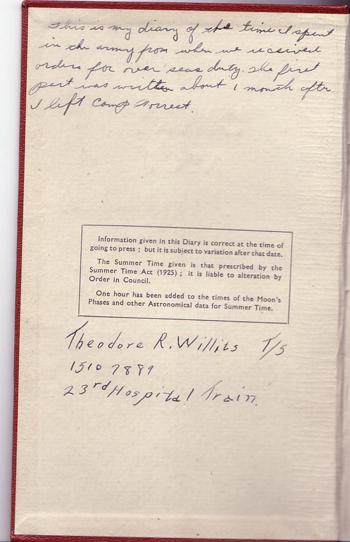
Inside cover of Theodore Willits’ diary from 1944.
The following diary entries have been re-typed from the original diary that Ted maintained during his service with Hospital Train No. 23. Some pages represent blank entries, and so have not been reproduced here. The following entry appears on the cover page of his diary:
This is my diary of the time I spent in the Army from when we received orders for overseas duty. The first part was written about 1 month after I left Camp Forrest.
Memoranda:
We left Camp Forrest, Tullahoma, Tennessee, Sunday, 29 August 1943 for a destination unknown. We left at 1700. 12 hours later, we departed Tullahoma for Chattanooga then went through Knoxville on to Washington, from Washington we went through Philadelphia and on to New Brunswick which is where we got off at Camp Kilmer, Stelton, New Jersey.
We stayed there for two weeks. While there, I went on three passes. On Saturday evening 11 September, we left Camp Kilmer for the P.O.E. We boarded ship at 2200 hours that same evening.
I was assigned to a hammock on the main deck. Sunday morning 12 September 1943, it was 0930 we cast off. Our ship was the British ship “Mauretania”. She is the fourth largest ship in the world. We went past the Statue of Liberty on our way out. We lost sight of the coast sometime mid-afternoon. The sea was very calm the whole trip, a little rough one night. We had English food which was not so good.
The weather varied from a nice sunshine to cold damp weather. We sighted land around 0800 or 0900 on Saturday morning which was Scotland. We continued on to our port which turned out to be Liverpool, England. We arrived too late to get in that night or early morning, so we had to wait until about 1400 on Sunday afternoon.
19 September we pulled into the dock and were among the first to debark which was around 2200. We boarded a train and traveled the rest of the night and got off at Swindon where we entrucked for a new Hospital around 4 miles from there. We stayed there until 1 October when we moved to a Hospital to be opened soon. We had to clean the wards, and subsequently the grounds. This hospital is located 4 miles uphill from the center of Cheltenham. I received the Good Conduct ribbon on 1 October 1943, there were six given out in an official ceremony.
The first patient arrived here at Ullenwood Army Hospital on Saturday, 16 October 1943. I started night duty on the Neuro-Psychiatric ward the next day, 17 October, with one patient.
On the morning of 5 November, I went to Gloucester and visited the Cathedral there. I heard we got our train now, which is true. On 21 November I was told by Sergeant Deare that I am to go on DS to help operate the train and bring it back. I’ll find out more about this tomorrow.
My DS assignment is put off indefinitely the next day. On 26 November 1943, I went into Hospital with nasopharyngitis. By 8 December I was discharged and started working on the Officers’ ward. Entirely missed out on DS while in Hospital. Never went to Glasgow, to help clean up the train.
12 December 1943, had my first Birthday overseas. I was fortunate to have a day off today.
1944:
January 1
This is a New Year. Welcomed it last night with a watch night. Religious services at Chapel, it is “Circumcision” today. I quit working on ward at noon because of leaving on DS first day of next week.
January 2
Went to Sunday service this morning. Had turkey for dinner. This afternoon went over on Lechampton Hill and took some pictures. Packing to leave in morning.
January 3
Postponed leaving until Wednesday, went into town this afternoon.
January 4
Went into town and took some pictures. A swell day for it.
January 5
Left this morning at 0830 hours. Went through Birmingham, Wolverhampton, Stafford, Crewe and got off at Warrington. Arrived at Hospital around 1600. Assigned to barracks with 20 other fellows.
January 6
Raining today. This morning did a little outside work. This afternoon went down and got dirty linen from train car and took clean linen along.
January 7
Started cleaning up car this morning. Never did a thing this afternoon, but talked about car going to London on an exhibit.
January 8
Car went off and left us this morning. Caught train this afternoon and went after it. It was moved to (word illegible -ed), 12 miles from London. Went through London on my way after it.
January 9
Car came out this morning to Transportation Corps site, where exhibit is to be held. Made beds and cleaned all day.
January 10
Finished cleaning car today for tomorrow’s show.
January 11
This was a big day. The exhibit started at 1300 and lasted until 1700 hours. We had one Colonel come through, Colonel John A. Rogers, also other high British and American Officers and British Members of Parliament as well as officials of the British Government. Sir Arnold was one.
January 12
Started home last night, took 20 hours to get there. Went via Cambridge, Blackley, Rugby and Crewe.
January 18
Started on another trip. Left here with 19 patients and went to Great Malvern. Went via Crewe and Hereford. Unloaded patients and started for Mansfield to pick up a load of NP cases.
January 19
Got up at Mansfield this morning and loaded patients and started back for Great Malvern. We had 15 NP cases. We went via Nottingham, Derby, Birmingham and Worcester. Started back for Warrington.
January 20
Got in at around 0700 this morning.
January 24
Took load of 40 patients from Crewe to Great Malvern and returned.
January 27
Started from here with 20 patients and went to Ellesmere and picked up 20 more. Took all of them to Great Malvern and returned.
January 28
Got in this morning, done nothing all day.
January 31
Started on a nice long trip this morning. We took 29 patients from here and went to Kidderminster via Crewe, Wellington and Wolverhampton. Unloaded and picked up 7 more and starting for Great Malvern to get some more. Staying all night at Worcester.
February 1
We picked up 15 patients at Great Malvern and took them all to Bristol. We went via Newport and the tunnel under the Channel (the Bristol Channel -ed). We left Bristol for Oxford and we stayed there all night. All patients were litter cases.
February 2
We picked up 23 litter patients and took them to Bristol via Didcot, Swindon and Bath. When we unloaded we went back to Oxford and stayed over all night.
February 3
Picked up 21 patients from Oxford and took them to Bristol. All litter cases. We left Bristol and started home via Newport, Hereford, Shrewsbury, Crewe and home, by morning.
February 4
Home all day and got ready to leave again tomorrow.
February 5
Started out this morning with 19 patients and went to Ellesmere to pick up more patients. Picked up 13 patients at Ellesmere and took them to Kidderminster.
February 6
Got back this morning.
February 20
Today woke up and went to Tewkesbury and went through the Abbey. Also saw house “Gupsill Manor” built in the 15th Century.
February 21
Went on hike today, did about 15 miles in 4 hours.
February 22
Arrived here in London on furlough. This afternoon walked around and saw Buckhingham Palace, Westminster Abbey, Houses of Parliament, Trafalgar Square, Piccadilly Circus. Also visited a GI art show which was very good.
February 23
Last night I experienced my first air raid. Lasted one hour. Nothing happened close by. Today went sightseeing, Tower of London, Tower Bridge, London Bridge. All Hallows Church and saw Roman ruins that were discovered under it. The church was founded in 645 AD. Saw ruins caused by bombing 2 years ago in dock area.
February 24
Jerry paid us another visit last night and hit close by. Also a short 15-minute raid in the morning. I went to Bishop Stratford and met Don Gibbs for first time in 17 months. Had more air raids so I started back.
February 25
Don came to visit this morning. We went to Mme Tussaud’s wax exhibit. In the afternoon saw damage done by recent bombings. Then saw 10 Downing Street and then went to show.
February 26
A peaceful night. Jerry never showed up last night. Today went on a tour with Mr Danby in charge. We went to wax exhibit in the morning and in the afternoon visited St. Paul’s Cathedral. Then to Westminster Abbey, we were there for services and sat in choir loft. I sat in the Mayor of Westminster’s seat. Came back via Buckingham Palace.

Two photographs showing care aboard a Hospital Train.
Top: A Hospital Train Medical Officer checking the condition of a patient.
Bottom: An attendant giving a patient liquid, while a Nurse observes.
February 27
Had a good sleep last night. This morning walked around some time and saw the last of the changing of the Palace’s Guard. Went to a show this afternoon.
February 28
This morning we never did much but walked around and took a few pictures. This afternoon we went through the Houses of Parliament.
February 29
Went up to Westminster Cathedral tower, the tallest in London, 280 foot. Saw changing of the Royal Guard. Returned home this afternoon.
March 27
Moved from Cheltenham to Glasgow today, and into the train.
April 7
Started this morning on another trip. First for train. Picked up patients at Malvern and Kidderminster.
April 8
Unloaded patients at Warwick. Back at 0400 hours.
April 26
Left Glasgow this evening for Newbury to get another train there.
April 27
Arrived at Newbury this afternoon. We came via London. We are staying in tents with no floors now.
May 19
Made T/4 today.
June 6
Invasion of France started today. Saw planes take off with paratroopers last night.
June 10
Started on first trip with this train. Picked up load of battle casualties from France at Netley. Took them to Kidderminster.
June 11
Unloaded patients and returned to Newbury.
June 13
Left on another trip today.
June 14
Got in from trip.
June 15
Left on trip this evening.
June 16
Got back at noon.
June 19
Went on a trip today. Took patients to Lincoln. 3 different air raids today.
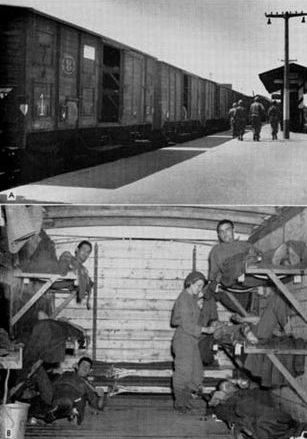
Top: The first Hospital Train movement on the Continent.
Bottom: The interior of a boxcar fitted with brackets to hold Litters.
June 20
Got back today.
June 23
Went on a run today. Picked up patients at Swindon and took them to Cheltenham. All patients were evacuated from France by air.
June 24
Went on a run today.
June 30
Went on another run today.
July 8
Left on a trip today.
July 11
Went on a trip today, traveled from Winchester to Shrewsbury.
July 12
Another trip today. Went from London to Chatham.
July 13
Another trip this morning. Went from Winchester to Kidderminster.
July 15
Trip today from Swindon to Audley End.
July 16
Left on another trip this evening. Went from Winchester to Wymondham.
July 17
Got back at noon today.
July 18
Swindon to Cardiff.
July 20
Malborough to (word illegible -ed).
July 22
Went on a trip from Netley to Oxford.
July 25
Started on another trip today from Netley to Oxford.
July 28
Went from Malborough to Stourport today.
July 31
Went from Newbury to Lincoln today.
August 3
Went from Swindon to Huntington.
August 4
I went to hospital for appendix.
August 5
Went on a trip today.
August 7
Went on another trip today. Traveled from Newbury to Kingston.
August 8
Took a load of Jerry PWs from Netley to Newbury.
August 9
Went on a trip today from Newbury to Malpas.
August 12
Went from Newbury to Ellesmere.
August 14
Trip today from Newbury to Malpas.
August 15
Trip from Swindon to Salisbury.
August 18
Trip today from Newbury to Morehampton.
August 19
Started on a late trip at 2300. Picked up British patients at Shrivenham and took them to Newport.
August 21
Trip today from Newbury to Morehampton.
August 24
Went on a trip today from Newbury to Leominster.
September 21
Left Newbury today at noon for Southampton.
September 22
Loaded on the boat (ferry) this evening.
September 23
Left England today for France at 0700 hours, and arrived at Cherbourg around 1500. Unloaded ferry at 2300.
September 24
Left today for Paris at 1500 hours.
September 25
Traveled all day today. Went through Rennes, St.-Lô, Mons and Chartres.
September 27
Arrived in Paris this morning at 0400. This afternoon started for Verdun around 1500.
September 28
Reached Verdun this morning around 0900. This afternoon had a pass and went into town for 3 hours.
October 10
Left Verdun today to pick up a load of patients. Picked them up at Etain and started for Paris.
October 11
Arrived in Paris and unloaded patients and picked up others, then left for La Haye-du-Puits.
October 13
Arrived at La Haye-du-Puits, but kept the patients all night because of bad weather, lots of mud and rain.
October 14
Unloaded patients and started for Paris.
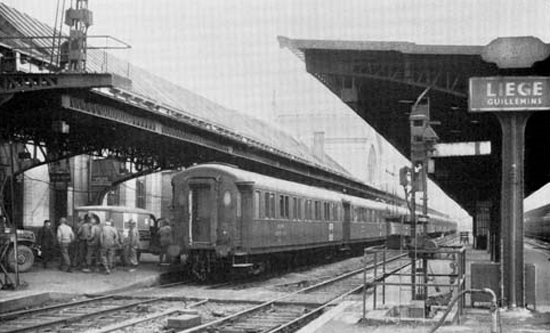
A Hospital Train being loaded at Liège, Belgium.
October 16
Arrived in Paris this evening and started for Liège, Belgium, 2 hours later.
October 18
Arrived in Liège early this morning and loaded patients and started back for Paris.
October 19
Got back from Liège this morning and unloaded patients by noon, had afternoon off. Walked around station and neighborhood. Starting back for Liège tonight.
October 20
Arrived in Verviers, Belgium, this morning.
October 22
Loaded up at noon today and started for Paris.
October 24
Arrived in Paris this morning.
October 25
Went out this morning and saw the Arc de Triomphe, and this evening I saw the Eiffel Tower.
October 26
Went out this afternoon for a while.
October 28
Started for Belgium tonight.
October 29
Arrived in Verviers today.
October 30
Loaded up this afternoon and started for Paris.
November 1
Arrived in Paris this morning.
November 2
Loaded up and headed for Cherbourg.
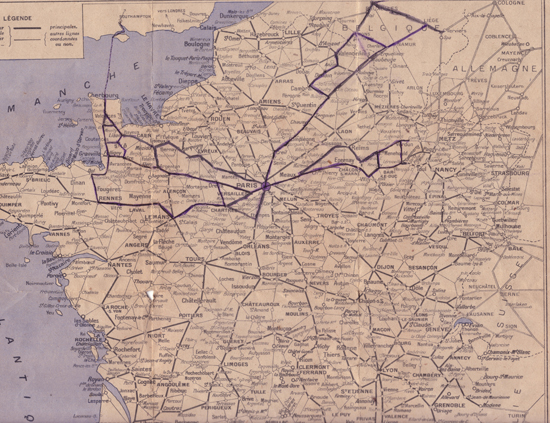
Map of France, Belgium and Germany showing the major railroad routes. Theodore has traced the route which was taken by Hospital Train No. 23 in blue ink.
November 4
Arrived in Cherbourg and loaded patients onto Hospital Ship.
November 5
Left this evening for Paris.
November 7
Arrived in Paris this evening.
November 8
Left for Cherbourg with load of patients midday.
November 10
Unloaded patients this evening.
November 11
Started back this morning.
November 15
Arrived in Paris this morning and loaded right up and started for Cherbourg at 1300.
November 17
Arrived at noon and loaded patients and started journey right back.
November 19
Got back to Paris this evening and started loading immediately.
November 20
Left Paris this morning.
November 21
Arrived in Cherbourg this evening and unloaded.
November 22
Started back early this morning.
November 23
Got back in Paris this afternoon and started up for Liège, Belgium.
November 24
Arrived in Liège late tonight and loaded patients.
November 25
Started back at 0700 hours.
November 27
Arrived in Cherbourg today. Trip took 59 hours after leaving Liège. Returned to Paris.
November 29
Arrived in Paris and went on to Liège.
November 30
Saw some buzz bombs (V-1s). Loaded at Liège and left around midnight.
December 1
Arrived in Paris around 2100 hours. Left Paris at 2300.

Illustration showing Private Fishman (left) and an unidentified cook of Hospital Train No. 23 in front of one of the train’s cars.
December 3
Arrived in Cherbourg at 0230 this morning.
December 4
Started for Paris this morning.
December 5
Arrived in Paris this morning and left for Commercy. Loaded tonight and started back.
December 6
Stayed in Paris until around 1700 today and started for Cherbourg.
December 7
Got to Cherbourg and unloaded this morning and started back.
December 9
Back in Paris this morning. Had passes for today.
December 10
Left for Verviers, Belgium, today.
December 11
Arrived in Verviers today.
December 12
Loaded and started back for Paris.
December 13
Got to Paris today and unloaded.
December 14
Loaded up at Paris this morning and started for Cherbourg.
December 16
Got back to Paris tonight.
December 17
Loaded up for Cherbourg.
December 18
Arrived in Cherbourg, unloaded and started back for Paris.
December 19
Got back and loaded up for Cherbourg. Left late at night.
December 21
Arrived in Cherbourg and had to wait for boat because of fog.
December 22
Started for Paris early this morning.
December 23
Got in and loaded at Paris and then went on to Cherbourg.
December 24
Unloaded at Cherbourg and started back.
December 25
Arrived in Paris at noon and loaded this evening for another journey to Cherbourg.
December 26
Back in Cherbourg this evening. Couldn’t unload because no boat and thick fog.
December 28
Unloaded tonight and started back.
December 29
Arrived in Paris tonight and loaded up.
December 30
Started back this morning for Cherbourg.
December 31
Got to Cherbourg, unloaded and started back late at night.
1945:
January 2
Got into Paris 0230 this morning and started loading an hour or so later. Left at 0800 for Cherbourg.
January 3
Got to Cherboug this evening, unloaded and started back.
January 4
Arrived in Paris late tonight.
January 5
Loaded at Paris and went to Cherbourg.
January 6
Arrived in Cherbourg, unloaded, and returned to Paris.
January 7
Back in Paris this evening. Had a pass.
January 8
Started for Bar-le-Duc this evening.
January 9
Loaded up this morning and started for Cherbourg.
January 10
At Lison. A munitions train blew up 250 yards from our train shattering most of the windows. No patients hurt badly.
January 11
Unloaded patients today.
January 12
Started for Paris this evening.
January 13
Arrived in Paris tonight.
Jauary 14
Train in shop, being repaired.
January 21
Train fixed up and out of shops. Loaded up and started for Cherbourg tonight.
January 23
Got to Cherbourg early this morning, unloaded and started back.
January 24
Back in Paris and further on to Bar-le-Duc.
January 25
Loaded up this morning and started for Cherbourg.
January 26
Arrived in Cherbourg, unloaded and returned.
January 27
In Paris this evening.
January 28
Left Paris last night for Nancy. Loaded around noon at Nancy and started for Cherbourg.
January 29
Got to Cherbourg and started back for Paris tonight.
January 30
Arrived in Paris this evening.
January 31
Went to Bar-le-Duc, loaded and started for Cherbourg.
February 2
Arrived in Cherbourg this morning and unloaded.
February 3
Left Cherbourg late last night. Arrived in Paris and continued to Commercy.
February 4
Loaded at Commercy and left for Cherbourg.
February 6
Got in Cherbourg tonight, unloaded and returned to Paris.
February 7
Arrived in Paris this morning.
February 12
Left Paris this morning for Commercy. Loaded up this evening and started for Cherbourg.
February 14
Arrived in Cherbourg this morning. Unloaded and back to Paris.
February 15
Arrived in Paris this morning.
February 16
Left Paris for Bar-le-Duc.
February 17
Loaded this morning and started for Cherbourg.
February 19
Arrived in Cherbourg this evening. Unloaded and back to Paris.
February 21
Arrived in Paris this morning.
February 23
Left Paris this evening for Verdun.
February 24
Arrived in Verdun this morning.
February 28
Loaded a number of patients here at Verdun and went on to Reims to finish up load.
March 1
Arrived in Cherbourg and unloaded. Started for Paris.
March 2
Arrived in Paris today.
March 5
Left Paris for Namur, Belgium.
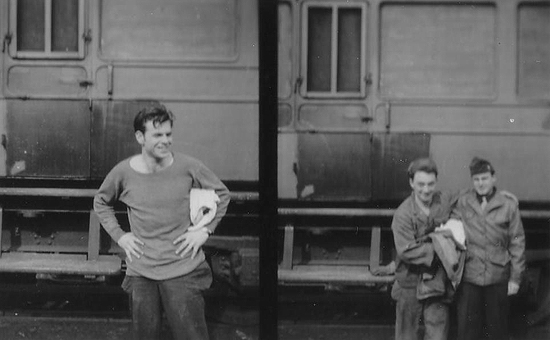
Unidentified members of the Transportation Corps crew operating on Hospital Train No. 23 pictured in front of a ward car somewhere in France, 1944.
March 6
Arrived in Namur this morning.
March 7
Left Namur and went on to Liège and loaded. Left Liège and returned to Paris.
March 8
After reaching Paris, went on to La Haye-du-Puits.
March 9
Arrived at La Haye-du-Puits, unloaded and started for Paris.
March 10
Left Paris for Reims and got there in the evening.
March 24
Picked up part of the load and went to Paris.
March 27
Train went into railway yards for paint job and repairs.
The authors would like to offer sincere thanks to Ellen Willits-Smith, daughter of T/4 Theodore Ross Willits (ASN:15107889) who kindly shared her Father’s diary entries and provided most of the texts used in this Testimony. All of the images were also kindly provided by Ellen.
